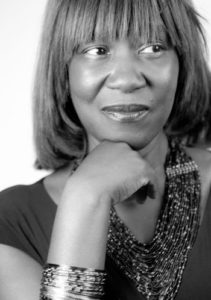
Patricia Smith
*Patricia Smith was born on this date in 1955. She is a Black poet, spoken-word performer, playwright, author, writing teacher, and former journalist.
Patricia Smith was born in Chicago, Illinois. She attended Southern Illinois University and the University of Northwestern. She has published poems in literary magazines and journals, including TriQuarterly, Poetry, The Paris Review, and Tin House, as well as anthologies, including American Voices and The Oxford Anthology of African American Poetry. She is on the Stonecoast MFA Program in Creative Writing faculty at Sierra Nevada College.
Smith is a four-time individual National Poetry Slam champion. Patricia Smith is the first Black woman to publish a weekly metro column for the Boston Globe. Her accomplishments include a Guggenheim fellowship, acceptance as a Civitellian, a National Endowment for the Arts grant recipient, and a two-time winner of the Pushcart Prize. She is a former Yaddo and the MacDowell Colony fellow, and the most successful poet of the National Poetry Slam competition. Smith is a professor at the College of Staten Island, a core faculty member in the MFA program at Sierra Nevada College, and a resident in VONA and the Vermont College of Fine Arts Post-Graduate Residency Program.
She has read her poetry at venues including the Poets Stage in Stockholm, Urban Voices in South Africa, Rotterdam's Poetry International Festival, the Aran Islands International Poetry and Prose Festival, and on tour in Germany, Austria, and the Netherlands. In the U.S., she's performed at the National Book Festival, Carnegie Hall, and the Dodge Poetry Festival. A selection of Smith's poetry was produced as a one-woman play by Nobel Prize-winner Derek Walcott and performed at both Boston University Playwrights Theater and the historic Trinidad Theater Workshop. Another play, based on Life According to Motown, was staged by Company One Theater in Hartford, CT, and reviewed favorably in The New York Times.
In an interview with Tony Leuzzi (a poet known for the poem "The Burning Door”), Smith talks about how she started writing poetry. She says, "I got introduced to poetry via the stage, where there isn’t a place to crawl behind the language." Patricia Smith published Life According to Motown in September 1991; it has been republished for its 20th anniversary edition. After Life According to Motown, Smith published Big Towns, Big Talks, which serves as a type of sequel to its predecessor, examining Life after a childhood in Chicago. In 1993, Smith published Close to Death, which explores black male life expectancy in drug abuse and AIDS.
Smith's poems give voice to the thousands of Black males in New York City, Chicago, and Boston who have run out of options and expect to lose their lives without first being given a chance to live. Publishers Weekly says, "Her acute ear for the intricacies of speech adds to the vitality of poems written in the voice of black men she encounters amid the inner-city squalor of Chicago and Boston." Her Teahouse of the Almighty is a collection of her free-verse poems on topics such as love, family, religion, feminism, and the role of poetry. The poem "Boy Dies, Girlfriend Gets His Heart" is about an actual event where a fifteen-year-old boy gave his heart to his girlfriend, and in another poem, Smith discusses her views on religion and her Baptist upbringing. Many critics have praised this work: Diane Scharper in Library Journal called it a "stunning mix of sound and sense and a Publishers Weekly critic stated: "Smith appears to be that rarest of creatures, a charismatic slam and performance poet whose artistry truly survives on the printed page."
She authored a book of history, Africans in America: Americans' Journey through Slavery, that was commissioned to accompany a PBS series of the same name and included short passages written by Charles Johnson and the WGBH Series Research Team. Her collection, Incendiary Art, grapples with the Black bodies of the Black community against the backdrop of the killing of Emmett Till. This collection employs various forms of poetry, such as prose, ghazals, sestinas, and sonnets. In Gotta Go Gotta Flow, Smith combines her poems with Michael Abramson's photography of the '70s in Chicago's South Side.
Donna Seman from Booklist praised this collection, saying it is "a supremely arresting and affecting match of potent images and singing words." For Shoulda Been Jimi Savannah, Smith won three awards: the Lenore Marshall Poetry Prize, the Rebekah Bobbitt National Prize for Poetry, and the Phillis Wheatley Book Award in Poetry. The collection contains poems about the urban areas of Chicago and Detroit, discussing themes of first love, Motown, personal narrative, and cultural journey. Gregory Orr, the 2014 Lenore Marshal Prize winner, said her poems “plunge to the soul-depths of the people who inhabit them." In addition to her poetry and journalism, Patricia Smith is a performer in two one-woman plays and a one-woman show called Professional Suicide. In Priya Parmar and Bryonn Bain's article "Spoken Word and Hip Hop: The Power of Urban Art and Culture," the authors argue that Smith, Taylor Mali, and Saul Williams ushered in a new era of poetry in the film documentary SlamNation.
Smith has contributed to various notable anthologies, including Unsettling America: An Anthology of Contemporary Multicultural Poetry, Aloud: Voices from the Nuyorican Poets Café, Short Fuse: The Global Anthology of New Fusion Poetry, Bum Rush the Page, The Oxford Anthology of African American Poetry and Pushcart Prize XXXII: Best of the Small Presses. In addition to her work, she also offers individual and group rates for poetry instruction from kindergarteners to senior citizens. Smith is married to Bruce DeSilva, a journalist and Edgar Award-winning author. She lives in Howell, New Jersey.